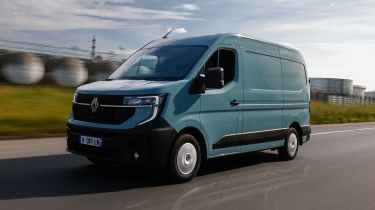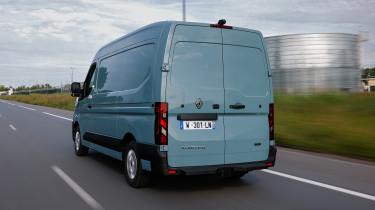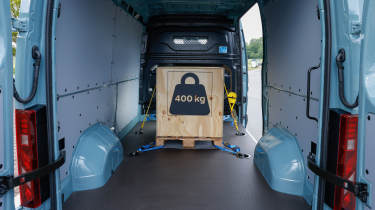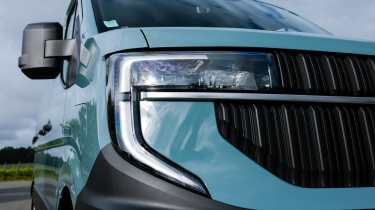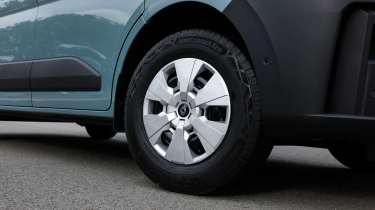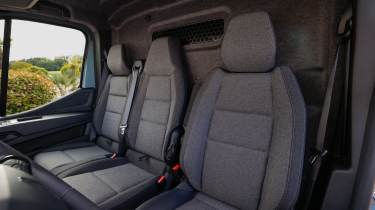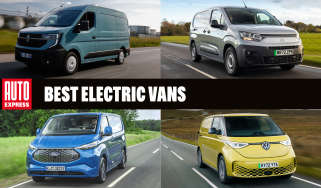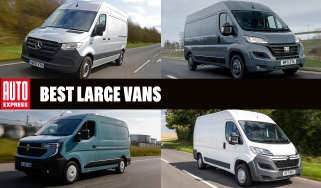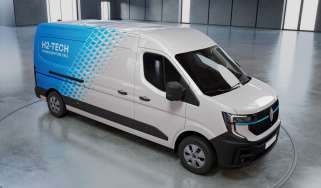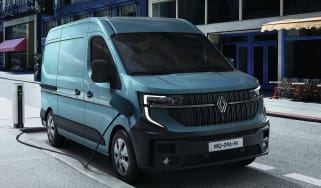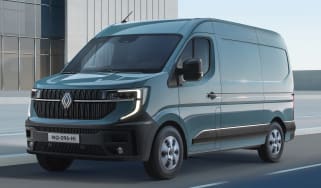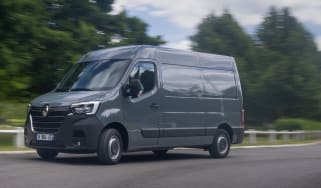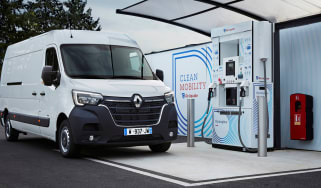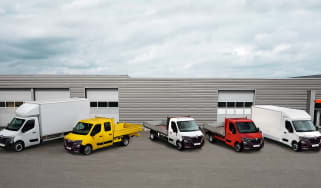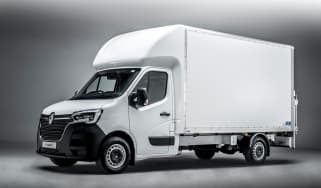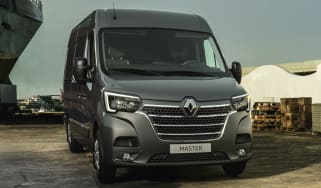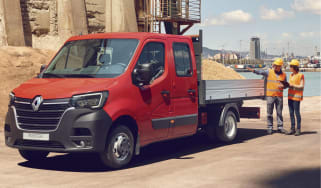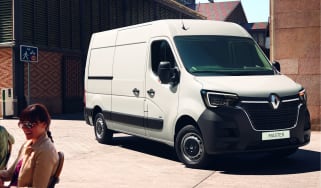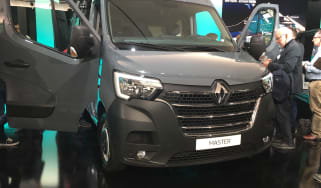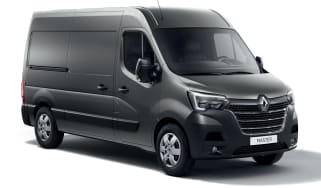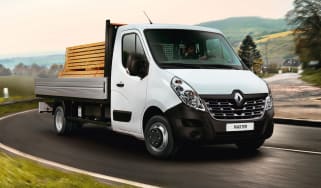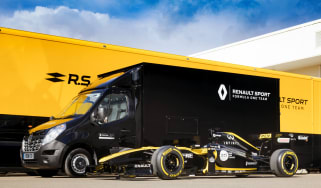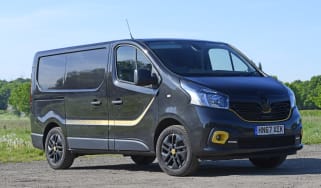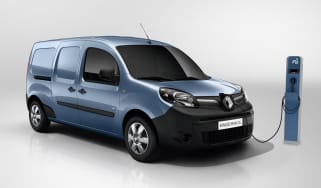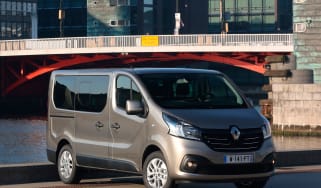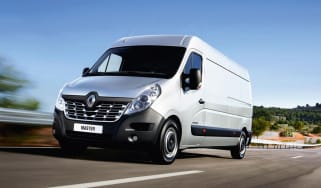Renault Master van review
All-new Renault Master impresses with a refined driving experience and class-leading EV range
About the Renault Master
It’s not often that a manufacturer decides to entirely redesign a van from the ground up, yet here we are with the all-new fourth-generation Renault Master. Starting from a blank slate was an important move for Renault, and one that it hopes will help close the gap to the Ford Transit and Mercedes Sprinter that currently occupy spot one and two as Europe’s best-selling large vans.
This Mk4 Renault Master replaces the third-gen model, first introduced in 2010 and later facelifted in 2019, with a fresh look and a newfound focus on aerodynamic efficiency. As the largest van in the brand’s lineup, it offers far greater load-hauling capabilities than its Trafic and Kangoo siblings. There are currently three different length and height combinations available for the panel and crew cab bodies, along with a range of factory conversions. All in, Renault claims there are 40 body configurations on offer. Subtle design decisions, including a more steeply-raked windscreen and small aero elements in the front bumper, have helped to reduce drag by 20 per cent compared to the old Master – an important metric when it comes to eeking out as much EV range as possible.
The diesel vans are front-wheel drive and come with three different power levels ranging from 128bhp to 168bhp. A six-speed manual gearbox is standard-fit, while a new nine-speed automatic will be available for all but the least powerful model. The electric Master E-Tech impresses with its class-topping range of up to 285 miles, a figure possible thanks to the slippery new bodywork and its big 87kWh battery. The latter is hooked up to a 138bhp front-mounted motor (other markets also get a smaller battery and motor pairing) that delivers 300Nm of torque – 50Nm behind the slowest diesel and some 130Nm off the Ford E-Transit.
More reviews
Road tests
Besides the Transit and Sprinter, rivals for the Renault Master include the Volkswagen Crafter, Fiat Ducato, Iveco Daily, Vauxhall Movano and Citroen Relay, while a new Nissan Interstar that’s based on the Master will appear in due course. Cargo volumes range from around 11 cubic metres in L2H2 form, to 15 cubic metres for the full-whack L3H3. Importantly, the load area is 100mm longer than in the outgoing model, while the sliding door opens 40mm wider to make it easier to load and unload large items.
Stepping out of the old Master and into the new one, the interior changes are just as significant as those on the outside. The dashboard is entirely new, featuring a slick 10-inch touchscreen with the same openR Link infotainment system as Renault’s passenger cars. There’s plenty of space for three to sit up front in comfort, and 135 litres of cabin storage make it practical, too.
The parallels between the Master and Renault’s passenger vehicles extend to the experience on the road. Everything feels pleasingly car-like, from the weighting of the controls to the noise levels and the ride comfort, making the Master an intuitive and comfortable van to drive both on the motorway and around town. Combine that with long electric range, a decent cargo capacity and a competitive price tag, and you have an excellent large van that impresses where it matters.
Prices kick off at under £34,000 (+VAT) for the entry-level diesel Master in L2H2 configuration. The Master E-Tech is pricier, of course, costing from around £43,000 (+VAT) , but that drops to under £40,000 with the Government’s low emission van grant. For context, the Ford E-Transit starts from roughly £50,000, while the Mercedes eSprinter will set you back closer to £60,000.
MPG, CO2 and Running Costs
Thanks to a more streamlined body, the new Renault Master has 20 per cent less drag than the old model and is the most aerodynamically efficient van in its class. In the real world, that means improved fuel economy and CO2 emissions as well as a longer electric range for the Master E-Tech.
The diesels use a new Blue dCi 2.0-litre four-cylinder engine with three power outputs. The base 130 engine can achieve up to 33.2mpg on the combined cycle, a figure that’s matched by the most powerful 170 engine. The middle-tier 150 engine fairs slightly better, achieving up to 34mpg. Note that these figures are for Masters equipped with the manual gearbox – we expect fuel economy drop marginally if the nine-speed automatic is fitted. CO2 figures are impressive for the class, with a 39g/km reduction compared to the outgoing Master. Emissions vary between 196 and 236g/km for all engines, with the exact figure depending on specification. There’s an ‘Eco’ mode for maximising fuel economy, but this simply reduces engine power by 30 per cent.
The electric Master E-Tech is fitted with an 87kWh battery, good for up to 285 miles of range. It’s a smaller battery pack than rivals, but the aerodynamically efficient bodywork means that range compares favourably, beating the latest E-Transit’s 249-mile maximum, the Citroen e-Relay’s 261-mile range, and the Mercedes eSprinter’s 273-mile range. During our test drive, we saw the battery lose 21 per cent of charge over the course of 52 miles with a 400kg payload, suggesting a laden real world range close to 250 miles. We drove across a mixture of high-speed and urban roads, in 20-degree temperatures with the air-conditioning on.
The battery can be DC rapid-charged at speeds of up to 130kW, allowing you to add over 140 miles of range in 30 minutes. AC home charging tops out at 22kW – fast enough for a 10-100 per cent recharge to be completed in around four hours. There’s no heat pump tech to speak of but Renault has implemented a unique battery thermal management system that it claims is more efficient. The battery itself is made up of 12 separate modules that can be removed, repaired or replaced individually, theoretically making it easier and cheaper to fix should something go wrong.
Load Space and Practicality
There’s a decent range of Renault Master bodystyles to choose from, including panel vans, crew cabs, chassis cabs and several factory-approved conversions. The panel van can be ordered in L2H2, L3H2 or L3H3 configurations, offering 10.8m3, 13.0m3 and 14.8m3 of cargo volume respectively. That’s slightly more than in the equivalent Ford Transits, but the Master lags behind the Citroen Relay and Iveco Daily, which offer up to 17.0m3 and 19.6m3 of load volume, respectively.
Currently, the diesel Masters are only offered with a 3.5-tonne maximum gross weight, while the Master E-Tech can also be ordered in 4.0-tonne configuration. Maximum payload capacity for the L2H2 diesel Master stands at 1,971kg, beating the 1,472kg of an equivalently-sized Transit.
By using a relatively small 87kWh battery, Renault has managed to keep the weight of the Master E-Tech relatively low. As a result, maximum payload capacities are higher than electric rivals, with the 3.5-tonne Master E-Tech carrying up to 1,125kg and the 4.0-tonne Master E-Tech managing up to 1,625kg. A 3.5-tonne Mercedes eSprinter can only manage a 774kg payload.
The load area is 100mm longer than before and the sliding door opening is now 40mm wider, increasing those dimensions to 3,225mm (3,855mm for L3 models) and 1,312mm respectively. There was never an issue fitting a Euro pallet through the door of the old Master, so it certainly won’t be a problem here.
New for the electric Master is ‘vehicle to load’ (V2L) charging, allowing you to power tools and appliances directly from its battery through power socket outlets in the cabin and load area. There’s ‘vehicle to grid’ (V2G) charging, too, letting you send power back into the grid.
Reliability and safety
Being a brand new van, it’s hard to accurately assess reliability at this point. The outgoing Renault Master model had a fairly spotless record and the new one uses the same engines found in the latest Renault Trafic which seem to be holding up without issue so far.
The Master comes with a comprehensive suite of safety and assistance systems across all models. There are 20 features in all, with highlights including autonomous emergency braking, driver attention monitoring, intelligent speed assist, traffic sign recognition and lane-keeping assist. Other helpful tech includes the standard-fit rear parking sensors, the trailer stability assistance and the (optional) digital rear-view mirror. We think the latter is worth paying for; it’s clear, bright and has virtually no delay.
Driving and Performance
We get three diesel variants of the Renault Master in the UK, along with one electric model - the Master E-Tech. The diesels all use new 2.0-litre Blue dCi engines, with power outputs of 128bhp, 148bhp and 168bhp. The first two get a six-speed manual gearbox as standard, while the most powerful of the three gets a new nine-speed automatic gearbox. The auto ‘box can be optioned with the 148bhp engine for an extra £2,000. Heavy duty Masters are only available with the 148bhp engine and manual gearbox.
On the move, the 148bhp model has plenty of punch down low, despite its peak 360Nm of torque lagging behind an equivalent Transit. We tested it on a variety of roads with a 400kg payload in the back and had no problem keeping up with traffic around town and on the motorway. Only above 3,000rpm does the pulling power begin to drop off, but we think it’s more than potent enough for most customers. If you’ll be regularly approaching the Master’s load capacity, the 168bhp has marginally more shove, but it’s only really noticeable when overtaking at motorway speeds. Torque stands at 360Nm, so in theory it should be more comfortable hauling heavy loads.
The six-speed manual gearbox is pleasant to use, with a short throw and robust action that makes it easy to navigate through the ratios. Similarly, the clutch pedal is intuitive and well-weighted for easy around-town driving. General refinement for the diesels is good, too, with engine noise only becoming obvious when you floor it and let the revs rise. It really isn't very different to driving a car.
The electric Master E-Tech is even more refined to drive, thanks to a silent and smooth motor and the absence of gears. With only 138bhp and 300Nm of torque, it’s no quicker than the diesels and can’t match the 430Nm E-Transit for acceleration or outright performance, but it felt nippy enough around town with a 400kg payload in the back. A regenerative braking mode, labelled ‘B’, allows for near one-pedal driving and slows the van down with quite some force when you lift off the throttle, but there’s no way to adjust its strength, which is frustrating.
The Master’s brakes are unique in that the power assistance adjusts to compensate for any load in the rear, ensuring that the pedal feels the same no matter the cargo. While we weren’t able to test the Master with different loads, the brakes were strong and predictable at all speeds, with a pedal that felt well-matched to the weighting of the accelerator and clutch.
This new generation of Renault Master brings a shorter wheelbase than before, resulting in a tighter turning radius, and we found no problem piloting the Master through narrow French streets. The steering is just as pleasant at faster speeds, with good accuracy that makes it easy to place in its lane along the motorway. Ride quality is a highlight, the Master dealing remarkably well with small and large bumps alike and with a welcome absence of rattles. The standard-fit bulkhead does well to isolate the driver from the load area and prevents any knocks or bangs reverberating through to the cabin.
Cab and Interior
The cab of the new Renault Master feels like a big step forward from the old model. Renault looked to large trucks for inspiration for the new S-shaped dashboard, which improves legroom and angles some of the key controls towards the driver. It’s a far cry from Renault vans of old, feeling much closer to a regular passenger car than a typical commercial vehicle. There’s plenty of adjustment for both the seat and steering wheel, so we had no issue finding a comfortable driving position, and visibility is great thanks to large mirrors placed out of the way of the A-pillars.
There are two trim levels to choose from – Advance and Extra – and both come with a crisp 10-inch infotainment touchscreen that runs a Google-based software interface with Apple CarPlay and Android Auto connectivity. It’s simple to operate, very responsive, and within easy reach of the driver’s seat. Plus, the dashboard serves as a handy ledge to rest your hand on when using the touchscreen on the move. The climate control dials are big and sturdy, and sit above a large wireless smartphone charging pad. Electric Renault Masters come with a digital driver’s display, while diesel models are fitted with analogue dials (the digital display will be available as an option in 2025).
The base Advance model gets manual air-conditioning, electric windows, automatic lights and windscreen wiper and rear parking sensors among other features, while the Extra trim adds Google Maps and voice control to the infotainment, blue upholstery stitching, LED load area lighting and some additional 12V sockets. There’s no keyless-entry or start and all models have a manual handbrake for now, which seems slightly at odds with the modern electric drivetrain. Van drivers will probably appreciate the old school approach, however, and there’s no mistaking whether it's on or off. Renault has confirmed that an electronic item is coming in 2025.
You get 135 litres of storage space dotted around the cab, including some large bins above the dashboard and a big space under the middle seat. Said seat can be folded down to create a handy desk area with USB-C ports to keep devices topped up. There’s one big cup holder at each side of the dashboard, but the middle passenger has no choice but to hold their coffee.
|
Van dimensions | |||
| Body style | Height | Width | Length |
| L2H2 van | 2,502mm | 2,080mm | 5,680mm |
| L3H2 van | 2,502mm | 2,080mm | 6,315mm |
| L3H3 | 2,780mm | 2,080mm | 6,315mm |
|
Load area dimensions | ||||
| Body style | Height | Width | Length | Volume |
| L2H2 van | 1,885mm | 1,537mm | 3,225mm | 10.8m3 |
| L3H2 van | 1,885mm | 1,537mm | 3,855mm | 13.0m3 |
| L3H3 | TBC | 1,537mm | 3,855mm | 14.8m3 |
